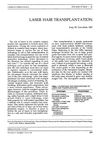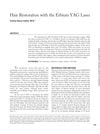Advancements in Skin Resurfacing Technologies: CO₂ and Er:YAG Lasers, Fractional Photothermolysis, and Plasma Resurfacing
August 2007
in “
Seminars in Plastic Surgery
”

TLDR Newer skin resurfacing lasers reduce damage and scarring, with some approved for safe use and minimal side effects.
The 2007 document reviews advancements in skin resurfacing technologies, with a focus on the evolution of CO₂ lasers, which minimize thermal damage and scarring during skin resurfacing. It highlights the development of high-power pulsed and superpulsed CO₂ lasers that adhere to selective photothermolysis principles for effective treatment with reduced thermal injury. Complications from CO₂ laser resurfacing can include swelling, erythema, and more serious effects if misused. The document also covers the Er:YAG laser, which produces less thermal necrosis, and the combined Er:YAG/CO₂ laser system for fine-tuned resurfacing. Additionally, it introduces fractional photothermolysis (Fraxel) and plasma resurfacing technologies, which offer skin remodeling with minimal downtime and side effects. Fraxel has been FDA-approved for various skin conditions and is considered safe, while plasma resurfacing is approved for facial rhytides and other skin lesions, also with minimal side effects. These technologies aim to improve cosmetic surgery outcomes with fewer side effects.



